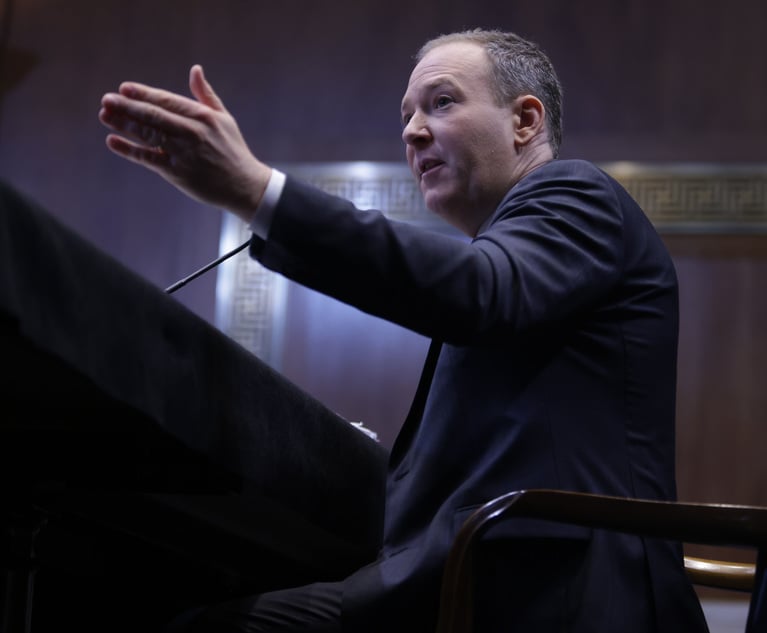Dakota Access Pipeline Legal Battle to Rage Through Summer
Gibson Dunn, representing Dakota Access, must file its opening brief by July 17 regarding the Standing Rock Sioux's request to shut down the pipeline. A decision is not expected for months.
June 21, 2017 at 07:17 PM
17 minute read
The protesters and cameras are gone and oil is flowing through the Dakota Access Pipeline in North Dakota, but the battle over the 1,200-mile pipeline continues in a federal courtroom in Washington, D.C.
In the next few months, a team of lawyers at Gibson, Dunn & Crutcher and Norton Rose Fulbright will try to convince a district judge to keep the pipeline open while the U.S. Army Corps of Engineers reassesses the permit it granted Dakota Access. The Standing Rock Sioux and other nearby tribes asked that the pipeline be shut down Wednesday during the Corps' review.
Opening briefs on the issue from Dakota Access and the Corps were set for July 17, and the tribes' response is due Aug. 7. A decision isn't expected until as early as September.
Last week, in a 91-page opinion, Judge James Boasberg ruled the Corps' permitting process was legally flawed. Boasberg ordered the Corps to conduct further review to determine if an EIS is needed, but declined to vacate the existing permit.
Leading the charge for Dakota Access, which joined forces with the Army Corps as an intervenor, are William Scherman, David Debold and Miguel Estrada of Gibson Dunn, and Kimberly Caine and Robert Comer of Norton Rose. Alan Glen of Nossaman is also on the team.
Opposing them is Jan Hasselman with the environmental legal group Earthjustice, who is arguing the case on behalf of the Standing Rock Sioux.
“Our view is that until there is a proper risk analysis that looks at the risk of oil spills, that considers the impacts to the tribe, they shouldn't be operating that pipeline,” Hasselman said after the hearing. “We'll be saying that as forcefully as we can to the court.”
Another concern for the tribes, raised multiple times during the hearing Wednesday, is whether the Corps will allow public comment and input from the tribes during the review. If they don't, Hasselman said his clients will seek a court order requiring it.
“If the Army Corps goes into a room and closes the door and comes up with a new analysis, … we won't have moved this ball forward. We won't have solved any legal problem. We'll just be back in front of the court again,” Hasselman said. “So our position is, this needs to be an open process.”
The tribes had argued that under the National Environmental Policy Act, the Corps should be required to conduct a full environmental impact statement, known as an EIS, before issuing a permit to Dakota Access. In December, the Obama administration rescinded the permit and ordered an EIS. But in February, the Trump administration rescinded that order and granted the permit.
For much of last year, the litigation ran parallel to massive protests by tribe members and activists at the pipeline construction site in North Dakota. An estimated 10,000 people camped out in the area to protest, the last of whom were cleared out in February. Tensions reached new heights after protests turned violent amid clashes with private security officers in September. North Dakota then-Gov. Jack Dalrymple even activated the state's National Guard to assist local law enforcement with the protests.
The protesters and cameras are gone and oil is flowing through the Dakota Access Pipeline in North Dakota, but the battle over the 1,200-mile pipeline continues in a federal courtroom in Washington, D.C.
In the next few months, a team of lawyers at
Opening briefs on the issue from Dakota Access and the Corps were set for July 17, and the tribes' response is due Aug. 7. A decision isn't expected until as early as September.
Last week, in a 91-page opinion, Judge James Boasberg ruled the Corps' permitting process was legally flawed. Boasberg ordered the Corps to conduct further review to determine if an EIS is needed, but declined to vacate the existing permit.
Leading the charge for Dakota Access, which joined forces with the Army Corps as an intervenor, are William Scherman, David Debold and Miguel Estrada of
Opposing them is Jan Hasselman with the environmental legal group
“Our view is that until there is a proper risk analysis that looks at the risk of oil spills, that considers the impacts to the tribe, they shouldn't be operating that pipeline,” Hasselman said after the hearing. “We'll be saying that as forcefully as we can to the court.”
Another concern for the tribes, raised multiple times during the hearing Wednesday, is whether the Corps will allow public comment and input from the tribes during the review. If they don't, Hasselman said his clients will seek a court order requiring it.
“If the Army Corps goes into a room and closes the door and comes up with a new analysis, … we won't have moved this ball forward. We won't have solved any legal problem. We'll just be back in front of the court again,” Hasselman said. “So our position is, this needs to be an open process.”
The tribes had argued that under the National Environmental Policy Act, the Corps should be required to conduct a full environmental impact statement, known as an EIS, before issuing a permit to Dakota Access. In December, the Obama administration rescinded the permit and ordered an EIS. But in February, the Trump administration rescinded that order and granted the permit.
For much of last year, the litigation ran parallel to massive protests by tribe members and activists at the pipeline construction site in North Dakota. An estimated 10,000 people camped out in the area to protest, the last of whom were cleared out in February. Tensions reached new heights after protests turned violent amid clashes with private security officers in September. North Dakota then-Gov. Jack Dalrymple even activated the state's National Guard to assist local law enforcement with the protests.
This content has been archived. It is available through our partners, LexisNexis® and Bloomberg Law.
To view this content, please continue to their sites.
Not a Lexis Subscriber?
Subscribe Now
Not a Bloomberg Law Subscriber?
Subscribe Now
NOT FOR REPRINT
© 2025 ALM Global, LLC, All Rights Reserved. Request academic re-use from www.copyright.com. All other uses, submit a request to [email protected]. For more information visit Asset & Logo Licensing.
You Might Like
View All
Bill Would Allow Californians to Sue Big Oil for Climate-Linked Wildfires, Floods
3 minute read
EPA Nominee Zeldin Says Climate Change Is Real, Agency Shouldn't Suffocate Economy

Supreme Court Denies Oil Giants' Appeal to End State Climate Suits

Switching Positions: US Solicitors General and Climate Change Lawsuits
6 minute readTrending Stories
- 1Uber Files RICO Suit Against Plaintiff-Side Firms Alleging Fraudulent Injury Claims
- 2The Law Firm Disrupted: Scrutinizing the Elephant More Than the Mouse
- 3Inherent Diminished Value Damages Unavailable to 3rd-Party Claimants, Court Says
- 4Pa. Defense Firm Sued by Client Over Ex-Eagles Player's $43.5M Med Mal Win
- 5Losses Mount at Morris Manning, but Departing Ex-Chair Stays Bullish About His Old Firm's Future
Who Got The Work
J. Brugh Lower of Gibbons has entered an appearance for industrial equipment supplier Devco Corporation in a pending trademark infringement lawsuit. The suit, accusing the defendant of selling knock-off Graco products, was filed Dec. 18 in New Jersey District Court by Rivkin Radler on behalf of Graco Inc. and Graco Minnesota. The case, assigned to U.S. District Judge Zahid N. Quraishi, is 3:24-cv-11294, Graco Inc. et al v. Devco Corporation.
Who Got The Work
Rebecca Maller-Stein and Kent A. Yalowitz of Arnold & Porter Kaye Scholer have entered their appearances for Hanaco Venture Capital and its executives, Lior Prosor and David Frankel, in a pending securities lawsuit. The action, filed on Dec. 24 in New York Southern District Court by Zell, Aron & Co. on behalf of Goldeneye Advisors, accuses the defendants of negligently and fraudulently managing the plaintiff's $1 million investment. The case, assigned to U.S. District Judge Vernon S. Broderick, is 1:24-cv-09918, Goldeneye Advisors, LLC v. Hanaco Venture Capital, Ltd. et al.
Who Got The Work
Attorneys from A&O Shearman has stepped in as defense counsel for Toronto-Dominion Bank and other defendants in a pending securities class action. The suit, filed Dec. 11 in New York Southern District Court by Bleichmar Fonti & Auld, accuses the defendants of concealing the bank's 'pervasive' deficiencies in regards to its compliance with the Bank Secrecy Act and the quality of its anti-money laundering controls. The case, assigned to U.S. District Judge Arun Subramanian, is 1:24-cv-09445, Gonzalez v. The Toronto-Dominion Bank et al.
Who Got The Work
Crown Castle International, a Pennsylvania company providing shared communications infrastructure, has turned to Luke D. Wolf of Gordon Rees Scully Mansukhani to fend off a pending breach-of-contract lawsuit. The court action, filed Nov. 25 in Michigan Eastern District Court by Hooper Hathaway PC on behalf of The Town Residences LLC, accuses Crown Castle of failing to transfer approximately $30,000 in utility payments from T-Mobile in breach of a roof-top lease and assignment agreement. The case, assigned to U.S. District Judge Susan K. Declercq, is 2:24-cv-13131, The Town Residences LLC v. T-Mobile US, Inc. et al.
Who Got The Work
Wilfred P. Coronato and Daniel M. Schwartz of McCarter & English have stepped in as defense counsel to Electrolux Home Products Inc. in a pending product liability lawsuit. The court action, filed Nov. 26 in New York Eastern District Court by Poulos Lopiccolo PC and Nagel Rice LLP on behalf of David Stern, alleges that the defendant's refrigerators’ drawers and shelving repeatedly break and fall apart within months after purchase. The case, assigned to U.S. District Judge Joan M. Azrack, is 2:24-cv-08204, Stern v. Electrolux Home Products, Inc.
Featured Firms
Law Offices of Gary Martin Hays & Associates, P.C.
(470) 294-1674
Law Offices of Mark E. Salomone
(857) 444-6468
Smith & Hassler
(713) 739-1250








